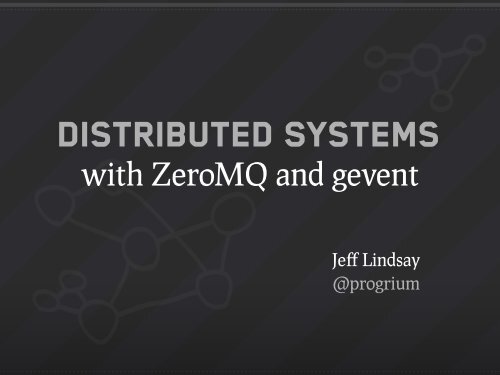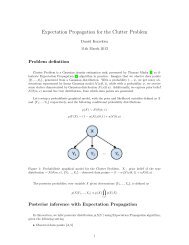with ZeroMQ and gevent - GitHub
with ZeroMQ and gevent - GitHub
with ZeroMQ and gevent - GitHub
You also want an ePaper? Increase the reach of your titles
YUMPU automatically turns print PDFs into web optimized ePapers that Google loves.
Distributed Systems<br />
<strong>with</strong> <strong>ZeroMQ</strong> <strong>and</strong> <strong>gevent</strong><br />
Jeff Lindsay<br />
@progrium
Why distributed systems<br />
Harness more CPUs <strong>and</strong> resources<br />
Run faster in parallel<br />
Tolerance of individual failures<br />
Better separation of concerns
Most web apps evolve into<br />
distributed systems
OpenStack
Amazon AWS<br />
Provider<br />
Web<br />
API<br />
Provider<br />
Client<br />
Provider<br />
TwiML
<strong>ZeroMQ</strong> + <strong>gevent</strong><br />
Two powerful <strong>and</strong> misunderstood tools
Concurrency<br />
Heart of Distributed Systems
Distributed computing<br />
is just another flavor of<br />
local concurrency
Multithreading<br />
Shared Memory<br />
Thread<br />
Thread<br />
Thread<br />
Distributed system<br />
Shared Database<br />
App<br />
App<br />
App
Concurrency models<br />
Execution model<br />
Defines the “computational unit”<br />
Communication model<br />
Means of sharing <strong>and</strong> coordination
Concurrency models<br />
Traditional multithreading<br />
OS threads<br />
Shared memory, locks, etc<br />
Async or Evented I/O<br />
I/O loop + callback chains<br />
Shared memory, futures<br />
Actor model<br />
Shared nothing “processes”<br />
Built-in messaging
Examples<br />
Erlang<br />
Actor model<br />
Scala<br />
Actor model<br />
Go<br />
Channels, Goroutines<br />
Everything else (Ruby, Python, PHP, Perl, C/C++, Java)<br />
Threading<br />
Evented
Erlang is special.<br />
Normally, the networking of<br />
distributed systems is tacked on to the<br />
local concurrency model.<br />
MQ, RPC, REST, ...
Why not always use Erlang
Why not always use Erlang<br />
Half reasons<br />
Weird/ugly language<br />
Limited library ecosystem<br />
VM requires operational expertise<br />
Functional programming isn’t mainstream
Why not always use Erlang<br />
Half reasons<br />
Weird/ugly language<br />
Limited library ecosystem<br />
VM requires operational expertise<br />
Functional programming isn’t mainstream<br />
Biggest reason<br />
It’s not always the right tool for the job
Amazon AWS<br />
Provider<br />
Web<br />
API<br />
Provider<br />
Client<br />
Provider<br />
TwiML
Service Oriented<br />
Architecture<br />
Multiple languages<br />
Heterogeneous cluster
RPC
RPC<br />
Client / server
RPC<br />
Client / server<br />
Mapping to functions
RPC<br />
Client / server<br />
Mapping to functions<br />
Message serialization
RPC<br />
Client / server<br />
Mapping to functions<br />
Message serialization<br />
Poor abstraction of what you really want
What you want are tools to help you get distributed<br />
actor model concurrency like Erlang ... <strong>with</strong>out Erlang.<br />
Even better if they're decoupled <strong>and</strong> optional.
Rarely will you build an application as<br />
part of a distributed system that does<br />
not also need local concurrency.
Communication model<br />
How do we unify communications in local concurrency<br />
<strong>and</strong> distributed systems across languages
Execution model<br />
How do we get Erlang-style local concurrency <strong>with</strong>out<br />
interfering <strong>with</strong> the language's idiomatic paradigm
<strong>ZeroMQ</strong><br />
Communication model
Misconceptions
Misconceptions<br />
It’s just another MQ, right
Misconceptions<br />
It’s just another MQ, right<br />
Not really.
Misconceptions<br />
It’s just another MQ, right<br />
Not really.
Misconceptions<br />
It’s just another MQ, right<br />
Not really.<br />
Oh, it’s just sockets, right
Misconceptions<br />
It’s just another MQ, right<br />
Not really.<br />
Oh, it’s just sockets, right<br />
Not really.
Misconceptions<br />
It’s just another MQ, right<br />
Not really.<br />
Oh, it’s just sockets, right<br />
Not really.
Misconceptions<br />
It’s just another MQ, right<br />
Not really.<br />
Oh, it’s just sockets, right<br />
Not really.<br />
Wait, isn’t messaging a solved problem
Misconceptions<br />
It’s just another MQ, right<br />
Not really.<br />
Oh, it’s just sockets, right<br />
Not really.<br />
Wait, isn’t messaging a solved problem<br />
*sigh* ... maybe.
Regular Sockets
Regular Sockets<br />
Point to point
Regular Sockets<br />
Point to point<br />
Stream of bytes
Regular Sockets<br />
Point to point<br />
Stream of bytes<br />
Buffering
Regular Sockets<br />
Point to point<br />
Stream of bytes<br />
Buffering<br />
St<strong>and</strong>ard API
Regular Sockets<br />
Point to point<br />
Stream of bytes<br />
Buffering<br />
St<strong>and</strong>ard API<br />
TCP/IP or UDP, IPC
Messaging
Messages are atomic<br />
Messaging
Messages are atomic<br />
Messaging
Messages are atomic<br />
Messaging
Messages are atomic<br />
Messaging
Messaging<br />
Messages are atomic<br />
Messages can be routed
Messaging<br />
Messages are atomic<br />
Messages can be routed
Messaging<br />
Messages are atomic<br />
Messages can be routed
Messaging<br />
Messages are atomic<br />
Messages can be routed<br />
Messages may sit around
Messaging<br />
Messages are atomic<br />
Messages can be routed<br />
Messages may sit around
Messaging<br />
Messages are atomic<br />
Messages can be routed<br />
Messages may sit around
Messaging<br />
Messages are atomic<br />
Messages can be routed<br />
Messages may sit around
Messaging<br />
Messages are atomic<br />
Messages can be routed<br />
Messages may sit around
Messaging<br />
Messages are atomic<br />
Messages can be routed<br />
Messages may sit around
Messaging<br />
Messages are atomic<br />
Messages can be routed<br />
Messages may sit around<br />
Messages are delivered
Messaging<br />
Messages are atomic<br />
Messages can be routed<br />
Messages may sit around<br />
Messages are delivered
Rise of the Big MQ
App<br />
App<br />
Reliable<br />
Message Broker<br />
App<br />
Persistent<br />
Queues<br />
App
App<br />
App<br />
App<br />
App
AMQP<br />
MQ<br />
Producer<br />
Consumer
AMQP<br />
MQ<br />
Producer<br />
X<br />
Exchange<br />
Binding<br />
Queue<br />
Consumer
AMQP<br />
MQ<br />
Producer<br />
X<br />
Exchange<br />
Queue<br />
Consumer
AMQP Recipes
AMQP Recipes<br />
Work queues<br />
Distributing tasks among workers
AMQP Recipes<br />
Work queues<br />
Distributing tasks among workers<br />
Publish/Subscribe<br />
Sending to many consumers at once<br />
X
AMQP Recipes<br />
Work queues<br />
Distributing tasks among workers<br />
Publish/Subscribe<br />
Sending to many consumers at once<br />
X<br />
Routing<br />
Receiving messages selectively<br />
foo<br />
X<br />
bar<br />
baz
AMQP Recipes<br />
Work queues<br />
Distributing tasks among workers<br />
Publish/Subscribe<br />
Sending to many consumers at once<br />
X<br />
Routing<br />
Receiving messages selectively<br />
RPC<br />
Remote procedure call implementation<br />
foo<br />
X<br />
bar<br />
baz
Drawbacks of Big MQ<br />
Lots of complexity<br />
Queues are heavyweight<br />
HA is a challenge<br />
Poor primitives
Enter <strong>ZeroMQ</strong><br />
“Float like a butterfly, sting like a bee”
Echo in Python<br />
Server<br />
Client<br />
1<br />
2<br />
3<br />
4<br />
5<br />
6<br />
7<br />
8<br />
9<br />
import zmq<br />
context = zmq.Context()<br />
socket = context.socket(zmq.REP)<br />
socket.bind("tcp://127.0.0.1:5000")<br />
while True:<br />
msg = socket.recv()<br />
print "Received", msg<br />
socket.send(msg)<br />
1<br />
2<br />
3<br />
4<br />
5<br />
6<br />
7<br />
8<br />
9<br />
10<br />
import zmq<br />
context = zmq.Context()<br />
socket = context.socket(zmq.REQ)<br />
socket.connect("tcp://127.0.0.1:5000")<br />
for i in range(10):<br />
msg = "msg %s" % i<br />
socket.send(msg)<br />
print "Sending", msg<br />
reply = socket.recv()
Echo in Ruby<br />
Server<br />
Client<br />
1<br />
2<br />
3<br />
4<br />
5<br />
6<br />
7<br />
8<br />
9<br />
10<br />
require "zmq"<br />
context = ZMQ::Context.new(1)<br />
socket = context.socket(ZMQ::REP)<br />
socket.bind("tcp://127.0.0.1:5000")<br />
loop do<br />
msg = socket.recv<br />
puts "Received #{msg}"<br />
socket.send(msg)<br />
end<br />
1<br />
2<br />
3<br />
4<br />
5<br />
6<br />
7<br />
8<br />
9<br />
10<br />
11<br />
require "zmq"<br />
context = ZMQ::Context.new(1)<br />
socket = context.socket(ZMQ::REQ)<br />
socket.connect("tcp://127.0.0.1:5000")<br />
(0...10).each do |i|<br />
msg = "msg #{i}"<br />
socket.send(msg)<br />
puts "Sending #{msg}"<br />
reply = socket.recv<br />
end
Echo in PHP<br />
Server<br />
Client<br />
1<br />
2<br />
3<br />
4<br />
5<br />
6<br />
7<br />
8<br />
9<br />
10<br />
11<br />
getSocket(ZMQ::SOCKET_REP);<br />
$socket->bind("tcp://127.0.0.1:5000");<br />
while (true) {<br />
$msg = $socket->recv();<br />
echo "Received {$msg}";<br />
$socket->send($msg);<br />
}<br />
><br />
1<br />
2<br />
3<br />
4<br />
5<br />
6<br />
7<br />
8<br />
9<br />
10<br />
11<br />
12<br />
getSocket(ZMQ::SOCKET_REQ);<br />
$socket->connect("tcp://127.0.0.1:5000");<br />
foreach (range(0, 9) as $i) {<br />
$msg = "msg {$i}";<br />
$socket->send($msg);<br />
echo "Sending {$msg}";<br />
$reply = $socket->recv();<br />
}<br />
>
Bindings<br />
ActionScript, Ada, Bash, Basic, C, Chicken<br />
Scheme, Common Lisp, C#, C++, D, Erlang,<br />
F#, Go, Guile, Haskell, Haxe, Java, JavaScript,<br />
Lua, Node.js, Objective-C, Objective Caml,<br />
ooc, Perl, PHP, Python, Racket, REBOL,<br />
Red, Ruby, Smalltalk
Plumbing
Plumbing
Plumbing
Plumbing
Plumbing
Plumbing<br />
inproc<br />
ipc<br />
tcp<br />
multicast
Plumbing<br />
inproc<br />
ipc<br />
tcp<br />
multicast<br />
socket.bind("tcp://localhost:5560")<br />
socket.bind("ipc:///tmp/this-socket")<br />
socket.connect("tcp://10.0.0.100:9000")<br />
socket.connect("ipc:///tmp/another-socket")<br />
socket.connect("inproc://another-socket")
Plumbing<br />
inproc<br />
ipc<br />
tcp<br />
multicast<br />
socket.bind("tcp://localhost:5560")<br />
socket.bind("ipc:///tmp/this-socket")<br />
socket.connect("tcp://10.0.0.100:9000")<br />
socket.connect("ipc:///tmp/another-socket")<br />
socket.connect("inproc://another-socket")
Plumbing<br />
inproc<br />
ipc<br />
tcp<br />
multicast<br />
socket.bind("tcp://localhost:5560")<br />
socket.bind("ipc:///tmp/this-socket")<br />
socket.connect("tcp://10.0.0.100:9000")<br />
socket.connect("ipc:///tmp/another-socket")<br />
socket.connect("inproc://another-socket")
Message Patterns
Message Patterns<br />
Request-Reply<br />
REQ<br />
REP
Message Patterns<br />
Request-Reply<br />
REP<br />
REQ<br />
REP<br />
REP
Message Patterns<br />
Request-Reply<br />
REP<br />
REQ<br />
REP<br />
REP
Message Patterns<br />
Request-Reply<br />
REP<br />
REQ<br />
REP<br />
REP
Message Patterns<br />
Request-Reply<br />
REP<br />
REQ<br />
REP<br />
REP
Message Patterns<br />
Request-Reply<br />
REP<br />
Publish-Subscribe<br />
SUB<br />
REQ<br />
REP<br />
PUB<br />
SUB<br />
REP<br />
SUB
Message Patterns<br />
Request-Reply<br />
REP<br />
Publish-Subscribe<br />
SUB<br />
REQ<br />
REP<br />
PUB<br />
SUB<br />
REP<br />
SUB<br />
Push-Pull (Pipelining)<br />
PULL<br />
PUSH<br />
PULL<br />
PULL
Message Patterns<br />
Request-Reply<br />
REP<br />
Publish-Subscribe<br />
SUB<br />
REQ<br />
REP<br />
PUB<br />
SUB<br />
REP<br />
SUB<br />
Push-Pull (Pipelining)<br />
PULL<br />
PUSH<br />
PULL<br />
PULL
Message Patterns<br />
Request-Reply<br />
REP<br />
Publish-Subscribe<br />
SUB<br />
REQ<br />
REP<br />
PUB<br />
SUB<br />
REP<br />
SUB<br />
Push-Pull (Pipelining)<br />
PULL<br />
PUSH<br />
PULL<br />
PULL
Message Patterns<br />
Request-Reply<br />
REP<br />
Publish-Subscribe<br />
SUB<br />
REQ<br />
REP<br />
PUB<br />
SUB<br />
REP<br />
SUB<br />
Push-Pull (Pipelining)<br />
PULL<br />
PUSH<br />
PULL<br />
PULL
Message Patterns<br />
Request-Reply<br />
REP<br />
Publish-Subscribe<br />
SUB<br />
REQ<br />
REP<br />
PUB<br />
SUB<br />
REP<br />
SUB<br />
Push-Pull (Pipelining)<br />
Pair<br />
PULL<br />
PUSH<br />
PULL<br />
PAIR<br />
PAIR<br />
PULL
Devices<br />
Queue Forwarder Streamer<br />
Design architectures around devices.
Devices<br />
Queue Forwarder Streamer<br />
REQ<br />
REP<br />
Design architectures around devices.
Devices<br />
Queue Forwarder Streamer<br />
PUB<br />
SUB<br />
Design architectures around devices.
Devices<br />
Queue Forwarder Streamer<br />
PUSH<br />
PULL<br />
Design architectures around devices.
Performance
Performance<br />
Orders of magnitude faster than most MQs
Performance<br />
Orders of magnitude faster than most MQs<br />
Higher throughput than raw sockets
Performance<br />
Orders of magnitude faster than most MQs<br />
Higher throughput than raw sockets<br />
Intelligent message batching
Performance<br />
Orders of magnitude faster than most MQs<br />
Higher throughput than raw sockets<br />
Intelligent message batching<br />
Edge case optimizations
Concurrency<br />
"Come for the messaging, stay for the easy concurrency"
Hintjens’ Law of Concurrency<br />
e = mc 2<br />
E is effort, the pain that it takes<br />
M is mass, the size of the code<br />
C is conflict, when C threads collide
Hintjens’ Law of Concurrency
Hintjens’ Law of Concurrency
Hintjens’ Law of Concurrency<br />
<strong>ZeroMQ</strong>:<br />
e=mc 2 , for c=1
<strong>ZeroMQ</strong><br />
Easy<br />
Cheap<br />
Fast<br />
Expressive<br />
... familiar socket API<br />
... lightweight queues in a library<br />
... higher throughput than raw TCP<br />
... maps to your architecture<br />
Messaging toolkit for concurrency <strong>and</strong> distributed systems.
<strong>gevent</strong><br />
Execution model
Threading vs Evented<br />
Evented seems to be preferred for scalable I/O applications
Evented Stack<br />
Non-blocking Code<br />
Flow Control<br />
I/O Abstraction<br />
Reactor<br />
Event Poller<br />
I/O<br />
Loop
1<br />
2<br />
3<br />
4<br />
5<br />
6<br />
7<br />
8<br />
9<br />
10<br />
11<br />
12<br />
13<br />
14<br />
15<br />
16<br />
17<br />
18<br />
19<br />
20<br />
21<br />
22<br />
23<br />
24<br />
25<br />
26<br />
27<br />
28<br />
29<br />
30<br />
31<br />
32<br />
33<br />
34<br />
def lookup(country, search_term):<br />
main_d = defer.Deferred()<br />
def first_step():<br />
query = "http://www.google.%s/searchq=%s" % (country,search_term)<br />
d = getPage(query)<br />
d.addCallback(second_step, country)<br />
d.addErrback(failure, country)<br />
def second_step(content, country):<br />
m = re.search('
<strong>gevent</strong><br />
“Regular” Python<br />
Greenlets<br />
Monkey patching<br />
Reactor / Event Poller
Green threads<br />
“Threads” implemented in user space (VM, library)
Monkey patching<br />
socket, ssl, threading, time
Twisted
Twisted<br />
~400 modules
<strong>gevent</strong><br />
25 modules
Performance<br />
http://nichol.as
Performance<br />
http://nichol.as
Performance<br />
http://nichol.as
Building a Networking App<br />
1<br />
2<br />
3<br />
4<br />
5<br />
6<br />
7<br />
8<br />
9<br />
10<br />
11<br />
12<br />
13<br />
#===<br />
# 1. Basic <strong>gevent</strong> TCP server<br />
from <strong>gevent</strong>.server import StreamServer<br />
def h<strong>and</strong>le_tcp(socket, address):<br />
print 'new tcp connection!'<br />
while True:<br />
socket.send('hello\n')<br />
<strong>gevent</strong>.sleep(1)<br />
tcp_server = StreamServer(('127.0.0.1', 1234), h<strong>and</strong>le_tcp)<br />
tcp_server.serve_forever()
1<br />
2<br />
3<br />
4<br />
5<br />
6<br />
7<br />
8<br />
9<br />
10<br />
11<br />
12<br />
13<br />
14<br />
15<br />
16<br />
17<br />
18<br />
19<br />
20<br />
21<br />
22<br />
#===<br />
# 2. Basic <strong>gevent</strong> TCP server <strong>and</strong> WSGI server<br />
from <strong>gevent</strong>.pywsgi import WSGIServer<br />
from <strong>gevent</strong>.server import StreamServer<br />
def h<strong>and</strong>le_http(env, start_response):<br />
start_response('200 OK', [('Content-Type', 'text/html')])<br />
print 'new http request!'<br />
return ["hello world"]<br />
def h<strong>and</strong>le_tcp(socket, address):<br />
print 'new tcp connection!'<br />
while True:<br />
socket.send('hello\n')<br />
<strong>gevent</strong>.sleep(1)<br />
tcp_server = StreamServer(('127.0.0.1', 1234), h<strong>and</strong>le_tcp)<br />
tcp_server.start()<br />
http_server = WSGIServer(('127.0.0.1', 8080), h<strong>and</strong>le_http)<br />
http_server.serve_forever()
1<br />
2<br />
3<br />
4<br />
5<br />
6<br />
7<br />
8<br />
9<br />
10<br />
11<br />
12<br />
13<br />
14<br />
15<br />
16<br />
17<br />
18<br />
19<br />
20<br />
21<br />
22<br />
23<br />
24<br />
25<br />
26<br />
27<br />
28<br />
29<br />
30<br />
31<br />
from <strong>gevent</strong>.pywsgi import WSGIServer<br />
from <strong>gevent</strong>.server import StreamServer<br />
from <strong>gevent</strong>.socket import create_connection<br />
def h<strong>and</strong>le_http(env, start_response):<br />
start_response('200 OK', [('Content-Type', 'text/html')])<br />
print 'new http request!'<br />
return ["hello world"]<br />
def h<strong>and</strong>le_tcp(socket, address):<br />
print 'new tcp connection!'<br />
while True:<br />
socket.send('hello\n')<br />
<strong>gevent</strong>.sleep(1)<br />
def client_connect(address):<br />
sockfile = create_connection(address).makefile()<br />
while True:<br />
line = sockfile.readline() # returns None on EOF<br />
if line is not None:<br />
print "
1<br />
2<br />
3<br />
4<br />
5<br />
6<br />
7<br />
8<br />
9<br />
10<br />
11<br />
12<br />
13<br />
14<br />
15<br />
16<br />
17<br />
18<br />
19<br />
20<br />
21<br />
22<br />
23<br />
24<br />
25<br />
26<br />
27<br />
28<br />
29<br />
30<br />
31<br />
32<br />
from <strong>gevent</strong>.pywsgi import WSGIServer<br />
from <strong>gevent</strong>.server import StreamServer<br />
from <strong>gevent</strong>.socket import create_connection<br />
def h<strong>and</strong>le_http(env, start_response):<br />
start_response('200 OK', [('Content-Type', 'text/html')])<br />
print 'new http request!'<br />
return ["hello world"]<br />
def h<strong>and</strong>le_tcp(socket, address):<br />
print 'new tcp connection!'<br />
while True:<br />
socket.send('hello\n')<br />
<strong>gevent</strong>.sleep(1)<br />
def client_connect(address):<br />
sockfile = create_connection(address).makefile()<br />
while True:<br />
line = sockfile.readline() # returns None on EOF<br />
if line is not None:<br />
print "
<strong>ZeroMQ</strong> in <strong>gevent</strong>
1<br />
2<br />
3<br />
4<br />
5<br />
6<br />
7<br />
8<br />
9<br />
10<br />
11<br />
12<br />
13<br />
14<br />
15<br />
16<br />
17<br />
18<br />
19<br />
20<br />
21<br />
22<br />
23<br />
24<br />
from <strong>gevent</strong> import spawn<br />
from <strong>gevent</strong>_zeromq import zmq<br />
context = zmq.Context()<br />
def serve():<br />
socket = context.socket(zmq.REP)<br />
socket.bind("tcp://localhost:5559")<br />
while True:<br />
message = socket.recv()<br />
print "Received request: ", message<br />
socket.send("World")<br />
server = spawn(serve)<br />
def client():<br />
socket = context.socket(zmq.REQ)<br />
socket.connect("tcp://localhost:5559")<br />
for request in range(10):<br />
socket.send("Hello")<br />
message = socket.recv()<br />
print "Received reply ", request, "[", message, "]"<br />
spawn(client).join()
Actor model<br />
Easy to implement, in whole or in part,<br />
optionally <strong>with</strong> <strong>ZeroMQ</strong>
What is <strong>gevent</strong> missing
What is <strong>gevent</strong> missing<br />
Documentation
What is <strong>gevent</strong> missing<br />
Documentation<br />
Application framework
gservice<br />
Application framework for <strong>gevent</strong>
1<br />
2<br />
3<br />
4<br />
5<br />
6<br />
7<br />
8<br />
9<br />
10<br />
11<br />
12<br />
13<br />
14<br />
15<br />
16<br />
17<br />
18<br />
19<br />
20<br />
21<br />
22<br />
23<br />
24<br />
25<br />
26<br />
27<br />
28<br />
29<br />
30<br />
31<br />
32<br />
from <strong>gevent</strong>.pywsgi import WSGIServer<br />
from <strong>gevent</strong>.server import StreamServer<br />
from <strong>gevent</strong>.socket import create_connection<br />
def h<strong>and</strong>le_http(env, start_response):<br />
start_response('200 OK', [('Content-Type', 'text/html')])<br />
print 'new http request!'<br />
return ["hello world"]<br />
def h<strong>and</strong>le_tcp(socket, address):<br />
print 'new tcp connection!'<br />
while True:<br />
socket.send('hello\n')<br />
<strong>gevent</strong>.sleep(1)<br />
def client_connect(address):<br />
sockfile = create_connection(address).makefile()<br />
while True:<br />
line = sockfile.readline() # returns None on EOF<br />
if line is not None:<br />
print "
1<br />
2<br />
3<br />
4<br />
5<br />
6<br />
7<br />
8<br />
9<br />
10<br />
11<br />
12<br />
13<br />
14<br />
15<br />
16<br />
17<br />
18<br />
19<br />
20<br />
21<br />
22<br />
23<br />
24<br />
25<br />
26<br />
27<br />
28<br />
29<br />
30<br />
31<br />
from <strong>gevent</strong>.pywsgi import WSGIServer<br />
from <strong>gevent</strong>.server import StreamServer<br />
from <strong>gevent</strong>.socket import create_connection<br />
from gservice.core import Service<br />
def h<strong>and</strong>le_http(env, start_response):<br />
start_response('200 OK', [('Content-Type', 'text/html')])<br />
print 'new http request!'<br />
return ["hello world"]<br />
def h<strong>and</strong>le_tcp(socket, address):<br />
print 'new tcp connection!'<br />
while True:<br />
socket.send('hello\n')<br />
<strong>gevent</strong>.sleep(1)<br />
def client_connect(address):<br />
sockfile = create_connection(address).makefile()<br />
while True:<br />
line = sockfile.readline() # returns None on EOF<br />
if line is not None:<br />
print "
1<br />
2<br />
3<br />
4<br />
5<br />
6<br />
7<br />
8<br />
9<br />
10<br />
11<br />
12<br />
13<br />
14<br />
15<br />
16<br />
17<br />
18<br />
19<br />
20<br />
21<br />
22<br />
23<br />
24<br />
25<br />
26<br />
27<br />
28<br />
29<br />
30<br />
31<br />
32<br />
from gservice.core import Service<br />
from gservice.config import Setting<br />
class MyApplication(Service):<br />
http_port = Setting('http_port')<br />
tcp_port = Setting('tcp_port')<br />
connect_address = Setting('connect_address')<br />
def __init__(self):<br />
self.add_service(WSGIServer(('127.0.0.1', self.http_port), self.h<strong>and</strong>le_http))<br />
self.add_service(StreamServer(('127.0.0.1', self.tcp_port), self.h<strong>and</strong>le_tcp))<br />
self.add_service(TcpClient(self.connect_address, self.client_connect))<br />
def client_connect(self, address):<br />
sockfile = create_connection(address).makefile()<br />
while True:<br />
line = sockfile.readline() # returns None on EOF<br />
if line is not None:<br />
print "
1<br />
2<br />
3<br />
4<br />
5<br />
6<br />
7<br />
8<br />
9<br />
10<br />
11<br />
# example.conf.py<br />
pidfile = 'example.pid'<br />
logfile = 'example.log'<br />
http_port = 8080<br />
tcp_port = 1234<br />
connect_address = ('127.0.0.1', 1234)<br />
def service():<br />
from example import MyApplication<br />
return MyApplication()<br />
# Run in the foreground<br />
gservice -C example.conf.py<br />
# Start service as daemon<br />
gservice -C example.conf.py start<br />
# Control service<br />
gservice -C example.conf.py restart<br />
gservice -C example.conf.py reload<br />
gservice -C example.conf.py stop<br />
# Run <strong>with</strong> overriding configuration<br />
gservice -C example.conf.py -X 'http_port = 7070'
Generalizing<br />
<strong>gevent</strong> proves a model that can be implemented in almost<br />
any language that can implement an evented stack
<strong>gevent</strong><br />
Easy<br />
Small<br />
Fast<br />
Compatible<br />
... just normal Python<br />
... only 25 modules<br />
... top performing server<br />
... works <strong>with</strong> most libraries<br />
Futuristic evented platform for network applications.
Raiden<br />
Lightning fast, scalable messaging<br />
https://github.com/progrium/raiden
Concurrency models<br />
Traditional multithreading<br />
Async or Evented I/O<br />
Actor model
Conclusion<br />
Two very simple, but very powerful tools<br />
for distributed / concurrent systems
Thanks<br />
@progrium
















